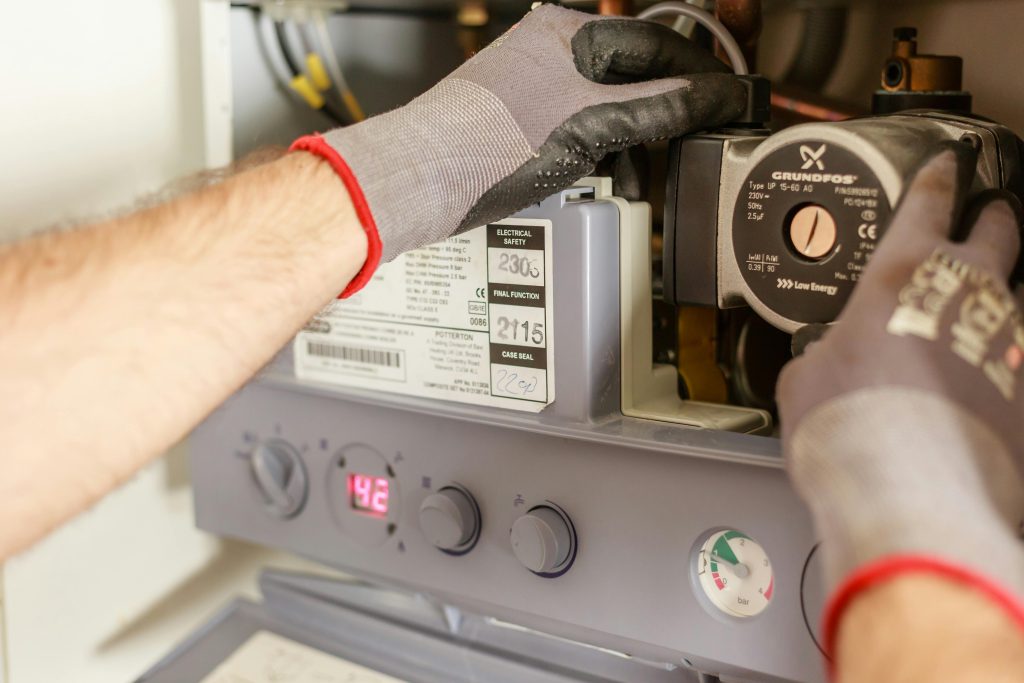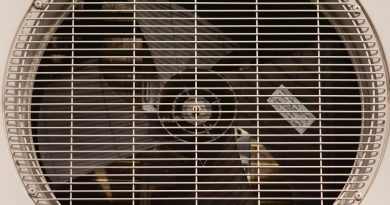Why Is My Boiler Leaking Water?
A leaking boiler isn’t just a plumbing issue; it’s an HVAC red flag that something deeper may be wrong. Whether it’s a slow drip or a full-on puddle, understanding the cause can save you from bigger headaches down the line.
Common Causes of a Leaking Boiler
Leaks don’t just happen, they’re your boiler’s way of signaling that something’s wrong. Think of it like a pressure cooker storing intense heat and pressure in a sealed metal shell. When a leak appears, it’s often your system saying, “I’m under more stress than I can handle.” If your boiler is leaking water, it could be due to worn parts, poor installation, or internal corrosion.
The most common culprits include worn internal components like seals and joints that degrade over time from constant heat and pressure cycles. Corrosion, from untreated water, air pockets, or mineral buildup, can eat away at the heat exchanger or pipes from the inside. Even tiny seam or joint failures act like microfractures in a dam, leading to a leaking boiler.
Faulty installation is another major factor; poorly soldered joints or mismatched fittings can start leaking within months if corners were cut. Pressure problems, often tied to a malfunctioning expansion vessel, can force water out through seals and relief valves. And in condensing boilers, a blocked condensate pipe can cause internal pooling or persistent dripping, which often gets mistaken for a boiler pipe leaking.
Bottom line: a leak is rarely just “bad luck.” It’s usually a symptom of deeper system stress, and a great technician won’t just patch it, they’ll track down what caused your boiler leaking in the first place.
Boiler Leaking from Bottom or Sides? It Might Be High Pressure
Absolutely, and it’s more common than people think. If your boiler is leaking from bottom seams or casing and the pressure gauge reads over 2.5 bar, especially when idle, it’s a clear warning. High pressure puts stress on every component, causing gaskets and seals to crack or bulge, and forcing relief valves to open early to shed water and prevent a rupture. That escaping water often shows up as leaks, your system’s way of shouting “Help!”
This pressure buildup can be caused by overfilling the system, a flat or waterlogged expansion vessel, or limescale restricting flow and increasing resistance. In winter, frozen condensate pipes can also back things up, leading to spikes in pressure, and more cases of boiler leaking water.
Most people don’t realize that a simple pressure check can prevent all of this and save hundreds on repairs. A good technician won’t just bleed the system; they’ll test the expansion vessel using the Schrader valve and reset it with nitrogen if needed. If your last service skipped that? Time to upgrade, especially if your boiler is leaking from bottom regularly.
Boiler Dripping Water from Pipe or Valve?
Knowing the source of a leak gives you a much clearer picture of the severity. A boiler dripping water from pipe connections or fittings might seem minor, but it could point to deeper issues.
A leak from the pressure relief valve (PRV) is often a symptom, not the root cause, it’s your system’s safety vent. Constant dripping could mean the boiler is over-pressurized, or that the valve is dirty or worn out and stuck open. The PRV is replaceable, but pressure issues must also be addressed if your boiler is leaking persistently.
If water is dripping from the pump area, the internal seal may be failing. This usually results from age, limescale buildup, or air in the system causing cavitation. Replacing the seal, or the pump head, is often enough if caught early and can stop your boiler pipe leaking altogether.
A leak from the heat exchanger is the big one. Caused by corrosion or cracks from thermal stress, it’s comparable to a cracked engine block. If water is showing up inside the burner compartment or deep within the unit, you’re likely looking at a major repair, often more than half the cost of a new boiler. In many cases, replacement is the more cost-effective route for a leaking boiler.
Bottom line: leaks from external components like valves or seals are often repairable. But leaks from internal or structural components like the heat exchanger can be terminal. Always get a second opinion, sometimes warranty or manufacturer coverage applies, but only if the system has been properly maintained.
Leaking Boiler Due to Rust or Corrosion
Yes, and it’s more than just cosmetic. Corrosion happens when oxygen and water mix with metal components over time, especially if the system water isn’t chemically treated with an inhibitor. Rust inside a sealed boiler often points to deeper issues: your heat exchanger could be at risk, pinhole leaks may be forming in the pipework, and sludge buildup could be choking flow and reducing efficiency.
If your boiler is leaking water and you see rust or sludge, it could mean corrosion is already spreading inside. Corrosion is often the smoking gun, but not the trigger. It’s usually caused by oxygen in the system, untreated water, galvanic reactions between mixed metals (like copper and steel touching), or sludge trapping heat in all the wrong places. And it’s rarely isolated, if your pipework is quietly rusting under the floorboards, a single patch won’t fix the problem.
Still, it’s serious, not always fatal. If caught early, a power flush and inhibitor treatment can restore flow and extend your boiler’s life. But if corrosion has already eaten into the heat exchanger or main tank, you’re likely facing a full replacement, especially if your boiler is leaking even after service.
Insider tip: if you want your next boiler to last 15+ years, ask for a magnetic filter and annual inhibitor top-ups. Most installers skip this unless you know to ask, and then you’ll avoid another boiler pipe leaking callout.
Boiler Pipe Leaking vs. Full Replacement
It depends on what’s leaking, and why. If the leak is visible and external, like from pump seals, PRVs, air vents, automatic bleeders, cracked fittings, or external pipe joints, it’s usually repairable. Condensate traps and drainage issues often fall into this category too. These are the most common causes when someone says, “my boiler pipe is leaking.”
But if the leak is structural, such as a cracked heat exchanger, rusted-through boiler casing, or recurring internal leaks that return after multiple repairs, it’s probably time for a replacement. A persistent boiler leaking from bottom after repairs is usually a red flag.
A skilled technician can usually tell within the first 20-30 minutes whether a repair is realistic or just buying time. Repair costs can add up quickly and often outweigh the value of an older boiler.
Here’s a rule of thumb: if your boiler is over 10 years old and the needed part costs more than 30% of a new unit, you’re likely throwing good money after bad. A trustworthy company will walk you through both options, no pressure. Especially if you’re dealing with a leaking boiler for the third time in a year.
Is It Safe to Use a Boiler That’s Leaking Water?
Short answer: No, it’s risky on multiple fronts.
Leaks reduce system pressure, which can cause your boiler to shut down unexpectedly or overheat. Water can also drip onto electrical components like the PCB, creating fire hazards or short circuits. Even if the boiler is leaking water slowly, continued use invites damage and danger.
If corrosion starts internally, you could be running an unsafe appliance with an unpredictable failure point. What starts as a minor issue can quickly escalate: best-case scenario, your heating shuts off randomly during a cold snap; worst case, the leak reaches electricals and sparks a fire risk. Most likely, it spreads slowly until a small £80 issue becomes a £600 breakdown, especially common with an older boiler leaking repeatedly.
Would you drive your car with oil leaking onto the engine block? Probably not. Turn it off, shut the cold-water feed if you know how, and call someone who can come the same day to look at your boiler dripping water from pipe or casing.
When a Leaking Boiler Needs a Pro
Call a pro as soon as you notice a leak, even if it seems minor. Time equals damage when water is involved, and that’s especially true with a leaking boiler.
Here’s what to expect: the technician will visually trace the leak source, not guess, check system pressure, inspect valves, and open the boiler casing if needed. They’ll test the expansion vessel, pressure relief valve, and look for signs of limescale, airlocks, or circulation issues. If it’s a small fix, it may be handled on the spot. If the part needs ordering or replacement is recommended, you’ll get a quote and timeline, particularly helpful if your boiler is leaking from bottom and pooling water.
After repairs, a good tech will repressurize the system, run the boiler, and check for secondary problems like scale or hidden sludge. Choose someone Gas Safe registered and experienced with your boiler brand, ideally one who offers full system diagnostics, not just patch jobs. This is especially important if your boiler pipe is leaking again after a previous repair.
Call if you hear dripping, hissing, see rust-colored water, or if the pressure gauge keeps dropping. Any visible water inside the boiler casing, or a leak greater than a teaspoon a day, is reason enough.
And don’t be afraid to ask: “Can you show me where the leak starts?” “Is the expansion vessel still holding air?” or “Do you recommend any upgrades to stop this happening again?” A trustworthy pro will walk you through it, especially if your boiler is leaking water more than once.





I wish I read this sooner. My boiler started leaking last winter and I had no clue what was going on. Thought it was just old age, but now I’m thinking it might’ve been the pressure or one of those little parts wearing out. Super easy to follow—thank you for this!
This is so important for a number of reasons! I will be honest I haven’t looked at the boiler since moving into my rental. You’ve inspired me. Thank you.
This is a really helpful article. I am saving it in case this ever comes up. Crossing my fingers that never happens.
That’s why we have our maintenance guy come to our house 2-3 times a year to check on everything. Can’t risk having a leaky boiler, lol
I can’t imagine trying to use a boiler that was leaking. Boilers are all about heat and pressure. If you have something like that with a leak… Oof. That’s scary.
This is so, so important. We had our boiler looked at because there was some water leaking out of the bottom. The tech guy said it was close to a critical pressure.
Exceptional information on something that is part of everyday life. Our home appliances need to be monitored and managed, and I really appreciate your input on when exactly a professional needs to be called for the boiler, and when you can fix things yourself.